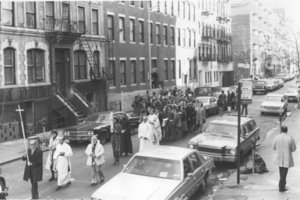 Today is the 32nd anniversary of death of the Servant of God Dorothy Day. The Benedictine Oblate from Brooklyn Heights, NY, who is remembered for her conversion to Christ and His Church and with Peter Maurin founded The Catholic Worker Movement.
Today is the 32nd anniversary of death of the Servant of God Dorothy Day. The Benedictine Oblate from Brooklyn Heights, NY, who is remembered for her conversion to Christ and His Church and with Peter Maurin founded The Catholic Worker Movement.
In recent days we’ve learned that the bishops of the USA are standing behind Day’s cause for canonization advancing it to the next canonical stage. While the process may be protracted for some, it is a good and substantial process to ascertain the claim of sanctity of the person in question. As an editorial, I tend to think 30 years is a good amount of time between the death of a person and the study process commencing; in my humble opinion I think it was far too short of time for Mother Teresa and Pope John Paul II beatifications; both are saints in my opinion, but I think the process can’t be shortchanged because of cosmic popularity.
Day was a Benedictine Oblate of St Procopius Abbey.
The Archdiocese of New York is in charge of the cause of canonization. You can contact the office at 212-371-1000, ext. 2474.
The following letter to the editors by Kenneth Woodward regarding the funeral of Dorothy Day which sheds some light on the New York Archdiocese’s involvement. Many are falsely led to believe the Church was callous because no bishop was present at the funeral Mass. Apparently, truth prevails. Read the letter.
To the Editors:
Your story on Dorothy Day and the bishops ignores a number of facts concerning her funeral, which I attended.
As it happened, Cardinal Terrance Cooke of New York wanted her funeral held in St. Patrick’s Cathedral, where the congregation would certainly have included many bishops, but the Catholic Worker community insisted that the funeral held in the neighborhood where Dorothy had lived so the poor could attend. Few actually did. At the church door each mourner was greeted by Cooke himself, not dressed in a cardinal’s finery but in a simple black cassock. Cooke did not stay for the mass because he did not want his presence to draw attention away from the woman for whose sake we mourners had gathered. Later, he held a memorial mass for Dorothy at the cathedral.
Cooke was a conservative churchman. So was Cardinal John O’Connor who formally initiated the cause on behalf of Dorothy Day’s canonization. Paradoxically, it was Father Daniel Berrigan and other members of the “Catholic Left” who opposed the effort to canonize Dorothy Day. Details can be found in my book, “Making Saints,” first published in 1996. Berrigan feared that in the canonization process the narrative of Day’s life would be stripped of its radical Christian elements. Those fears would indeed be realized if “Saint Dorothy” were to be venerated solely for her remorse for having had an abortion in the years prior to her conversion to Catholicism.
Kenneth L. Woodward
You also be interested to read the Eulogy given by the former Dominican Friar Geoffrey B. Gneuhs on December 2, 1980.